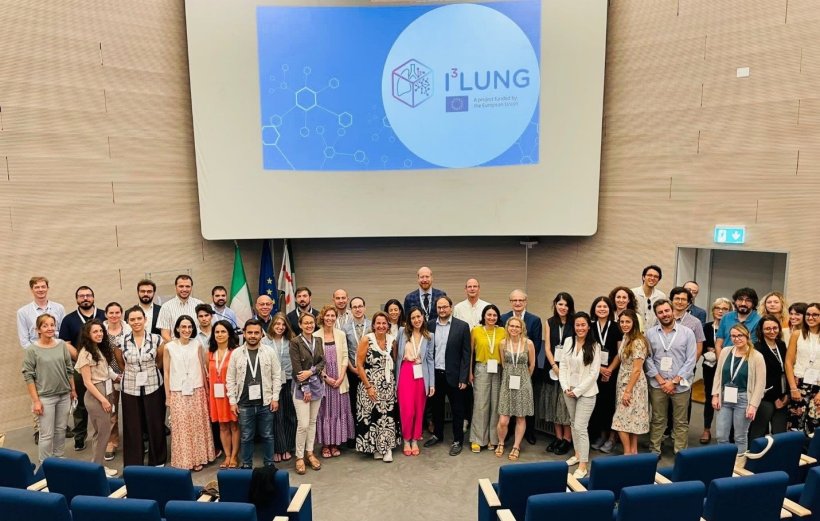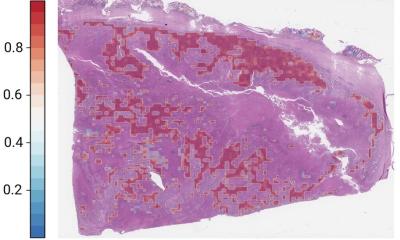
Image source: Politecnico de Milano
Article • AI-based personalized medical care
I³lung: EU launches lung cancer initiative
Report: Bernard Banga
This summer, The European Commission launched I3lung, a new research initiative as a part of Horizon Europe, the EU’s research and innovation program. This research initiative aims to create a cutting-edge, decision-making tool to help clinicians and patients select the best lung cancer treatment based on each patient’s specific needs and circumstances.

‘It’s all about using artificial intelligence (AI), particularly deep and machine learning, to analyse a host of available information such as clinical baseline, radiomics, and the biological characteristics of the tumour,’ said Arsela Prelaj, a cancer specialist at the National Cancer Institute of Milan, Italy. She is also a CEO and one of the coordinators for the I3Lung project.
The I3Lung initiative brings together 16 international partners from Germany, Belgium, Denmark, Italy, Sweden, Switzerland, the US, and Israel. I3Lung and its partners will have a timeframe of five years and €10M to turn their project into a tangible tool to address a primary unmet clinical need in the field of lung cancer.
Immunotherapy: A powerful, but flawed treatment strategy
Lung cancer is the second most common form of cancer worldwide after breast cancer. With a case distribution of 85% for non-small-cell lung carcinoma (NSCLC) and 15% small-cell lung carcinoma (SCLC), lung cancer is the leading cause of mortality in men over 40 and in women over 59 years of age. This equates to 1.8 million deaths worldwide, of which 370,000 are in Europe.
The advent of immunotherapy has revolutionized the treatment of patients. It has become the first-line therapy for metastatic NSCLC tumours lacking a targetable driver mutation. Today, immunotherapy is used either as monotherapy or in combination with routine chemotherapy. However, only 30% to 50% of patients experience a long-term response to immunotherapy. ‘Indeed, to this day, programmed death-ligand 1 (PD-L1) remains the only biomarker with a satisfactory record of prediction of a patient’s response to immuno-oncological agents,’ said Prelaj.
Overcoming current cancer treatment limitations

‘The challenge lies in developing a new generation of tools, capable of simultaneously analysing the vast amount of complex data relating to tumour biology,’ said Filippo de Braud, head of the Department of Oncology and the Medical Oncology Clinic at the National Cancer Institute, Milan. The I3Lung initiative plans to develop a platform for Europe and beyond to capitalize on these new tools for coping with the complexity of available data regarding lung cancer biomarkers.
Retrospective analysis of 2,200 patients treated with first-line immunotherapy between 2012 and 2021 at multiple centres will provide baseline clinical, radiomic, and biological tumour characteristics. ‘In addition, enrolling 200 new patients in a prospective study will generate new multi-omic biological data, including tumour mutational burden, circulating immune biomarkers profiling, digital pathology, gut microbiome, radiomics, and other multi-omics approaches,’ said De Braud. Additionally, a psychological study will be conducted that will incorporate patient experience and preferences to contribute to developing a shared decision support tool. Patients’ tumours will be subjected to state-of-the-art genomic analysis. Six clinical cancer centres based in Italy, Germany, Greece, Spain, Israel, and the United States are involved in these data collection processes.
Novel integrated AI-assisted data storage
The final goal is the construction of a novel integrated AI-assisted data storage and elaboration platform backed by reliable, comprehensible AI methodology. ‘It will ensure accessibility and ease of use for healthcare providers and patients alike,’ said De Braud.
Four institutes and med-tech companies from Italy will be pivotal to the success of I3Lung. The Polytechnic University of Milan and its spin-off, ML Cube S.r.l., specialists in computer systems design, will be jointly responsible for the implementation of this new generation of the platform. The Mario Negri Institute for Pharmacological Research will analyse patients’ tumour metabolism. The European Institute of Oncology will be responsible for evaluating the psychological impact of this method on patients and doctors alike.
This individualized approach will improve the outcome of therapy for patients by better matching them and their specific situations to the different treatments available. ‘If successful, the approach presented by I3Lung could soon justify an initial pilot study, which could expand on the project and attempt to apply the tools and techniques developed to all forms of cancer where patients are candidates for immunotherapy in routine practice,’ said Prelaj.
The 16 partners in I³lung:
- Fondazione IRCCS Institut Nationale dei Tumoru, Italy
- Politecnico di Milano, Italy
- Istituto di Ricerche Farmacologiche Mario Negri, Italy
- Istituo Europeo di Oncologia, Italy
- ML S.r.l. Cube, Italy
- LungenClinic Grosshansdorf GmbH, Germany
- Universitätsklinikum Hamburg-Eppendorf, Germany
- Vall d’Hebron Institute of Oncology, Spain
- Medica Scientia Innovation Research, Spain & USA
- Metropolitan Hospital, Greece
- Shaare Zedek Medical Center, Israel
- Katholieke Universiteit Leuven, Belgium
- The Swedish Institute for Health Economics, Sweden
- The University of Chicago, USA
- Aalborg Universitet, Denmark
- Lung Cancer Europe, Switzerland
21.11.2022





